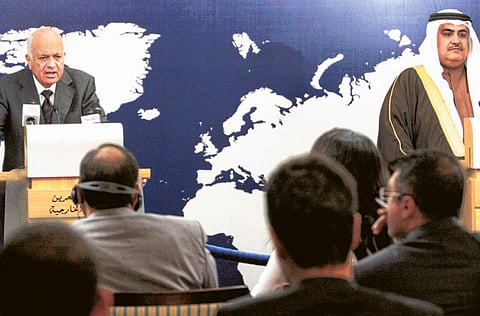Bahrain’s lower chamber to have more powers
Government will have the confidence of the lower chamber when its programme is endorsed by the lawmakers, Bahrain King said

Manama: Bahrain’s lower chamber is to be given the right to accept or reject the government’s action programme under amendments to the constitution.
The government will have the confidence of the lower chamber when its programme is endorsed by the lawmakers, King Hamad Bin Eisa Al Khalifa said on Sunday, as he announced a series of amendments to the constitution that give the elected chamber new distinctive powers that “would broaden democracy in Bahrain”.
“The philosophy and motivation for the constitutional amendments is to open new horizons for our democracy, based on the recommendations of the National Dialogue,” King Hamad said in a morning address to the nation.
“They will also reflect our commitment to the stability of the nation, the unity of our people and the fulfillment of their aspirations to develop our democracy and our political programmes, while taking into consideration the best interests of the homeland and of the present and future generations,” he said in the speech broadcast by Bahrain Television.
King Hamad in June called for a national dialogue to help heal the political, economic and social wounds caused by deep divisions between the various segments of the country over the merits of the protest movement that hit the country in February.
Around 300 people from the parliament, the government, labour unions, women’s groups, civil society, religious establishments, political parties and the media were invited for the multi-theme dialogue.
Even though the different opposition societies had divergent views over the merit of participating in the debates, the National Dialogue issued a series of recommendations that included introducing amendments to the constitution promulgated in 2002 to give more powers to the elected lower chamber of the bicameral parliament.
“In line with the conclusions of the National Dialogue, these constitutional amendments aim to reflect the popular will in the formation of the government based on its programme,” he said. “The Council of Representatives will discuss the action programme of the government after the cabinet takes the constitutional oath. It has the right to approve or reject the government programme, and if the programme is endorsed, the government gets the confidence of the Council,” he said.
The 40-member lower chamber will be the only entity to monitor the government’s action, he said.
“Only the Council has the right to state the lack of cooperation with the government as well as to initiate discussions on any public issue. The amendments add guarantees to ensure the participation of the Council of Representatives in session during the discussions of the questions addressed to ministers, and to set a timeframe for the government to justify reasons for not considering the Council’s demands,” King Hamad said.
The new powers are to be added to the Council’s already established rights to quiz ministers, move for a no-confidence vote in ministers and set up investigation committees, he said.
Under the amendments, the Speaker of the lower chamber takes over from the Chairman of the upper chamber the power to refer the bills approved by the two chambers to the Prime Minister and to chair the full parliament meetings whenever the members of both chambers meet.
King Hamad said that there would be new criteria and procedures for appointing members of the 40-seat upper house, the Shura Council.
According to the king, “democracy is not just texts or constitutional and legislative provisions.”
“Democracy is a culture and practice, a commitment to the rule of law, respect for the international principles of human rights, coupled with serious national political action that represents all spectrums of society without exclusion or quotas,” he said.
“In parallel with this crucial step that we take today, we call for other important steps to be made to reinforce the democratic culture and practice on the land of our country. We call upon all segments of society – the tribe, the community and the family – to work together to ensure that our young people respect the law. This is a responsibility that must be shouldered by all, especially when respect for the law is linked to the principles of coexistence, tolerance, harmony and love,” he said.



